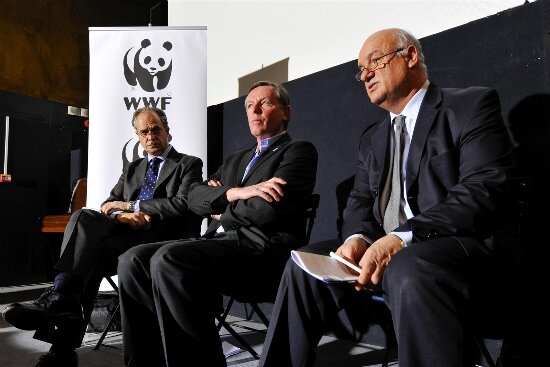Earlier this month, I went to Brussels for a private screening of our film, The End of the Line, and debated the sad state of Europe’s fisheries with Joe Borg, the Commissioner for Maritime Affairs and Fisheries.

Charles Clover, Tony Long of WWF and Joe Borg, Commissioner for Maritime Affairs and Fisheries, debate Europe’s fisheries policy after a WWF screening of The End of the Line
The screening had been organised by WWF for members of the European Commission and country representatives ahead of the publication of the Green Paper on the reform of Europe’s fisheries policy last week.
I was surprised and impressed by two things. First, the openness and dedication with which Commissioner Borg trotted along and watched an 82-minute film and debated its conclusions, especially since these are even more damning about Europe’s management of its fish stocks than the Commission’s own Green Paper – which admits that 90 per cent of Europe’s fish stocks are overfished.
Second, I was struck by the amazingly fortuitous timing of the release of our film on June 8, World Oceans Day, amid a debate about Europe’s mismanagement of its seas that will last until the end of the year. Our film should certainly get it going.
Though Mr Borg said he reserved judgment about some things in the film - particularly our view that the farming of carnivorous fish, such as salmon, bass and tuna, is at present unsustainable because of the overfishing of little fish to feed them - there was much to admire in what he proposes to do.
He wants to impose a ban on “discards” – the dumping of juvenile and over-quota fish over the side. This would end a practice that is morally wrong, as fishermen often tell us.
He wants to reform the CFP to place the ecological health of fish stocks uppermost and the economic viability of the industry which depends upon them second. This would end the nonsence behind the way quotas are currently negotiated each year.
The need, under present rules, to balance the health of the stocks with the health of the industry is a logical impossibility. It is a pretext for ignoring sound science and setting quotas higher than stocks can stand.
Though there was much to commend about Mr Borg’s proposals, I began to feel the old sensation I have felt so often in Brussels - that I had blundered into Wonderland.
Mr Borg’s reforms, if they ever happen, are painfully slow and will only bite in 2012. Before then, the member states who have been instrumental in setting quotas too high will have a chance to change them or make them ineffective.
And despite the good intent of some in the Commission who wrote the Green Paper, there is clearly some ill intent there, too.
How else could officials have negotiated the disgraceful, unscientific quotas for bluefin tuna in the Atlantic and Mediterranean this season (22,000 tons this year against scientific recommendations as low as 8,000 tons)?
That decision, at a meeting of the mis-named International Commission for the Conservation of Atlantic Tunas in November, was accompanied by brutal threats of EU trade sanctions against small Caribbean nations who dared to stick up for sound science and conservation-based quotas.
These threats were uttered in corridors and private meetings by officials from Mr Borg’s own Commission. What on earth was going on? When this sort of thing is allowed, how can we take any reform proposals at face value?
The reality is we can’t. Even if the reforms are adopted as they left Mr Borg’s pen last week, there is no guarantee that Commissioner, ministers or officials will act in accordance with what it says on paper.
They haven’t acted according to either the letter or the spirit of the reforms of 2002, which talk about sustainable management of fish stocks and precautionary quotas.
My view, expressed in debate with Mr Borg, is that the only way to get ministers and officials to observe the policies they adopt is to make the actions of the executive challengeable in the courts.
In the US only around 28 per cent of stocks are overfished and the excellent Magnuson-Stevens Act has been overhauled three times - at the instigation of citizens’ groups.
In Europe, concerned citizens have no legal “standing” to review the actions of the executive. Sad but true.
This insulting throwback dates from 1950s when the European Coal and Steel Community was a government club, not a legislature that affects the lives of nearly 500 million EU citizens.
If Mr Borg really wants to reform Europe’s fishing policy, he should start by empowering the citizen.
He should give citizens the legal right to check that he and his successors are doing a proper job and managing our seas sustainably.
![]()



Would someone please take this issue seriously? We are talking about the entire ocean ecosystems collapsing and we have fisheries ministers trying to squeeze every last dollar from it. This is a disgrace, shameful and we have caused it with our greed for fish oil, sushi and fish and chips. We need no take zones now.
This is why I voted for UKIP. Not that it will help. The EU is a disgrace.